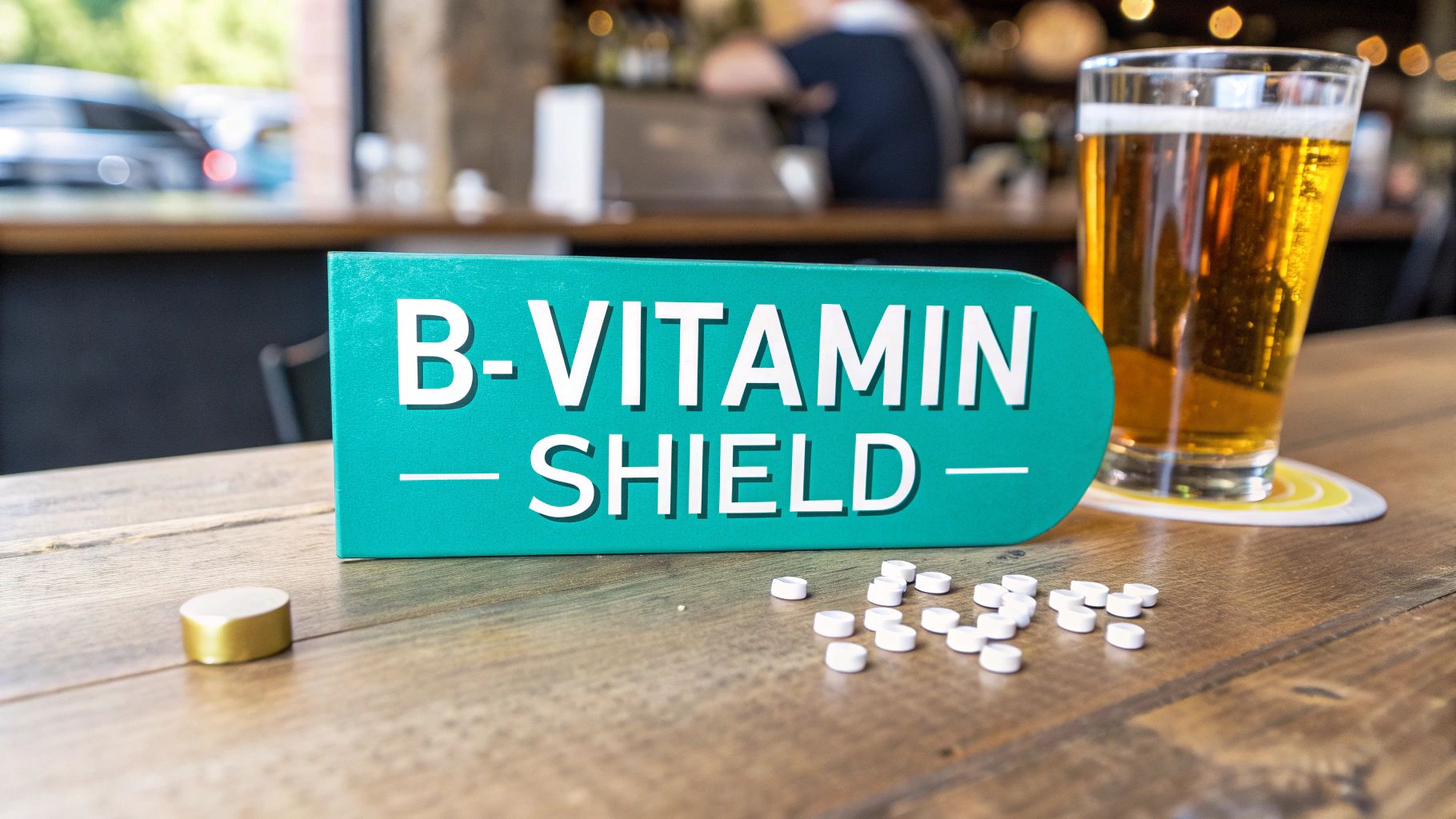

· By Annemarie
Alcohol and Vitamin B How to Protect Your Health
The link between alcohol and vitamin B isn't just a casual association—it's a direct cause and effect. Simply put, drinking alcohol actively drains your body's B vitamin reserves. This is a huge reason why hangovers feel so awful and can even affect your health down the road. It’s not just about what you're putting in, but what the alcohol is taking out.
The Hidden Link Between Alcohol and B Vitamins
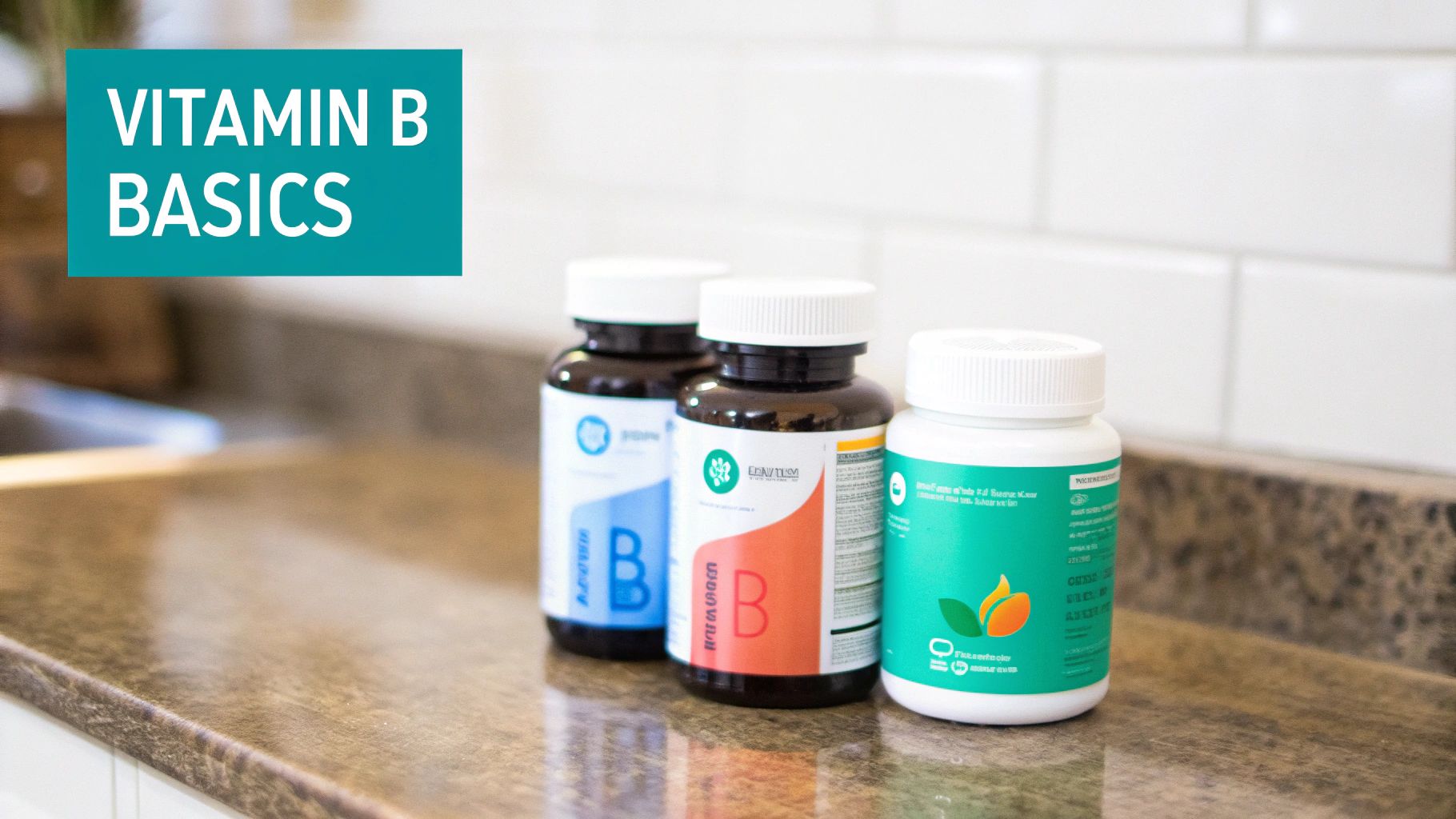
Imagine your body’s B vitamin supply is like a fully-stocked pantry. You need these ingredients for everything from generating energy to keeping your brain and nervous system running smoothly. When alcohol enters the picture, it’s like an uninvited guest who raids that pantry, using up your precious supplies and leaving the shelves bare.
This isn’t a slow, passive process. Alcohol essentially wages a multi-front war on your B vitamins, leaving you exposed to short-term misery and potential long-term problems.
How Alcohol Sabotages Your B Vitamins
Alcohol is more than just empty calories; it actively disrupts how your body handles these essential nutrients. First, it gets in the way of your digestive system's ability to absorb B vitamins from the food you eat. So, even that healthy meal you had before heading out might not be fully utilized.
On top of that, alcohol messes with your liver's ability to store these vitamins, making it tough to maintain a healthy backup supply. It also blocks the crucial "activation" step, which is what converts B vitamins into a form your body can actually use.
It's a classic catch-22. Your body desperately needs B vitamins to break down the alcohol you've consumed, but the alcohol itself is preventing you from absorbing and using them. This metabolic gridlock is a primary driver behind that drained, foggy feeling of a hangover.
This nutrient deficit has consequences you can feel almost immediately.
- Worse Hangovers: That crushing fatigue, brain fog, and general irritability? A significant part of that can be chalked up to a B vitamin deficiency.
- Tanked Energy Levels: B vitamins are the spark plugs for your body's energy production. When they're low, you're going to feel sluggish and completely wiped out.
- Long-Term Health Concerns: Over time, consistent depletion can lead to serious issues. A chronic lack of vitamin B1 (thiamine) is linked to severe neurological problems, while low levels of B9 (folate) and B12 can cause anemia and nerve damage.
Grasping this direct link between alcohol and B vitamins is the first step in being smarter about how you drink. It helps you see a hangover for what it really is: not just punishment for a fun night, but a clear sign of nutrient depletion and a body under serious metabolic stress.
Why Your Body Needs B Vitamins to Process Alcohol
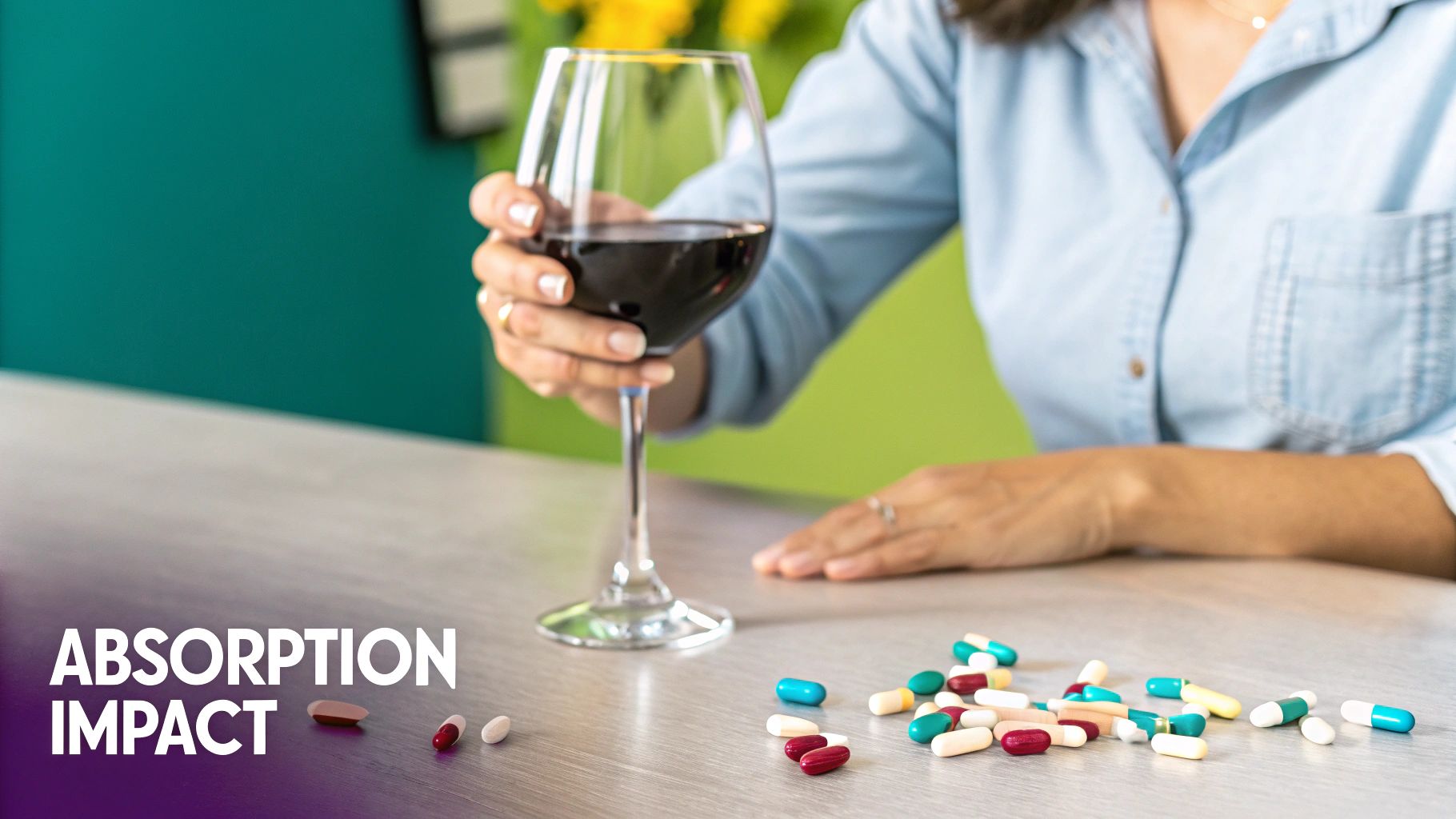
When you take a drink, your body immediately treats alcohol as a top-priority threat. It’s a toxin that needs to be dealt with, and fast. The best way to think about this is like an urgent factory assembly line firing up. Its sole purpose is to take the raw material—alcohol—and break it down into something harmless that your body can get rid of.
But for this metabolic factory to run smoothly, it needs two things: machinery and a crew to operate it. The machinery is a set of specialized proteins called enzymes, and the essential crew members are your B vitamins. Without B vitamins, the entire operation simply can't function.
The Metabolic Assembly Line for Alcohol
As soon as alcohol hits your bloodstream, your liver gets to work with two key enzymes. First, an enzyme called alcohol dehydrogenase (ADH) steps in. Its job is to convert the alcohol into a nasty, toxic compound called acetaldehyde. This substance is the real troublemaker behind many classic hangover symptoms and is known to cause cellular damage.
Right on its heels, a second enzyme, aldehyde dehydrogenase (ALDH), swoops in. It takes that toxic acetaldehyde and quickly transforms it into a harmless substance called acetate. From there, your body can easily break down acetate into simple water and carbon dioxide, which you then flush out.
Here's the most important part: both of those enzymes are utterly dependent on B vitamins to do their jobs.
B vitamins are what we call "coenzymes" or "cofactors." Think of them as the keys that turn the ignition for the ADH and ALDH enzymes. Without the right B vitamin key, the enzyme engine won't start, and the metabolic assembly line shuts down.
This shutdown causes a major problem—a toxic traffic jam. The poisonous acetaldehyde starts to build up in your system because it can't move to the next stage of processing. It's this buildup that is largely responsible for the pounding headache, nausea, and that all-around awful feeling of a hangover. Your body is stuck stewing in a toxin it can't effectively clear. You can get a deeper dive into this entire process in our guide on how your body metabolizes alcohol.
The Cost of Processing Alcohol
This creates a real catch-22 between alcohol and vitamin B. To power this detoxification process, your body raids its own reserves of B vitamins, especially B1 (Thiamine), B2 (Riboflavin), B3 (Niacin), and B6 (Pyridoxine). So, the more you drink, the more B vitamins you burn through, which in turn slows down the very assembly line needed to process the alcohol.
This intense demand can drain your nutrient stores with surprising speed. It's why a hangover feels like more than just dehydration—it’s a sign of serious metabolic stress, fueled by a sudden and sharp nutrient deficiency.
This isn't a minor effect, either. Research shows that drinking has a significant impact on the metabolism of several B vitamins. For example, heavy drinking disrupts the body’s ability to convert vitamin B6 into its active form, which is crucial for brain chemistry. It also messes with B12 absorption, which can lead to neurological issues over time. The link between alcohol and vitamin depletion is a well-documented global health concern.
Meet the B Vitamin Family: Your Hangover Allies
When it comes to defending your body against a night of drinking, not all B vitamins are created equal. Think of them as a highly specialized team, where each member has a very specific job. Once you understand their individual roles, it becomes crystal clear why being low on even one of them can throw your whole system out of whack after a few drinks.
Let’s get to know the key players who are working overtime behind the scenes when you're enjoying a cocktail.
The A-Team for Alcohol Metabolism
While the entire B-complex is important, a few members are right there on the front lines, processing the alcohol and fighting off that next-day misery. They're the essential workers your body calls on first.
-
B1 (Thiamine): The Energy Generator. Thiamine is the spark plug for converting the food you eat, especially carbs, into usable energy. Alcohol is packed with carbs but has zero nutritional value, so your body torches its Thiamine reserves to process it. This is a huge reason you feel so completely drained and fatigued the next day.
-
B2 (Riboflavin): The Cellular Defender. Think of Riboflavin as your cellular bodyguard. It’s crucial for protecting your cells from oxidative stress—that’s the damage caused by unstable molecules that alcohol metabolism churns out like crazy. It also helps activate other key B vitamins, like B6 and Folate.
-
B3 (Niacin): The Detox Driver. Niacin is a non-negotiable part of the alcohol breakdown crew. It directly supports the enzymes (ADH and ALDH) that metabolize alcohol and its toxic byproduct, acetaldehyde. If you run low on Niacin, this whole detox process grinds to a halt, leaving those hangover-causing toxins to hang around far longer than you'd like.
While this trio handles the immediate cleanup, the rest of the family plays vital supporting roles in your recovery.
The Essential Support Crew
Beyond the initial metabolic battle, other B vitamins are critical for managing alcohol’s secondary effects, like mood swings, anxiety, and that bone-deep exhaustion.
B5 (Pantothenic Acid): The Adrenal Supporter. This vitamin is essential for producing stress hormones. Drinking puts your body under a surprising amount of physiological stress, making your adrenal glands work overtime. This depletes B5 and contributes to that awful "wired but tired" feeling.
B6 (Pyridoxine): The Mood Stabilizer. Vitamin B6 is a must-have for making the neurotransmitters that keep your mood stable, like serotonin and dopamine. Alcohol disrupts B6, which is a big reason why post-drinking blues, anxiety, and irritability are so common. It's also another key player on the alcohol metabolism assembly line.
B9 (Folate) & B12 (Cobalamin): The Brain and Blood Builders. This dynamic duo is vital for healthy nerve function and making new red blood cells. Unfortunately, alcohol messes with the absorption of both, leading to brain fog, fuzzy memory, and that profound, can't-get-off-the-couch fatigue. A B12 deficiency can start subtly with just irritability or balance issues, but it gets worse over time.
A hangover is so much more than a headache. It's a complex storm of symptoms driven by very specific nutrient shortfalls. As you can see in our guide covering the science-backed causes of hangovers, replenishing these specific B vitamins is a direct way to tackle the root cause of why you feel so rough.
The infographic below shows just how common these deficiencies are for people who drink.
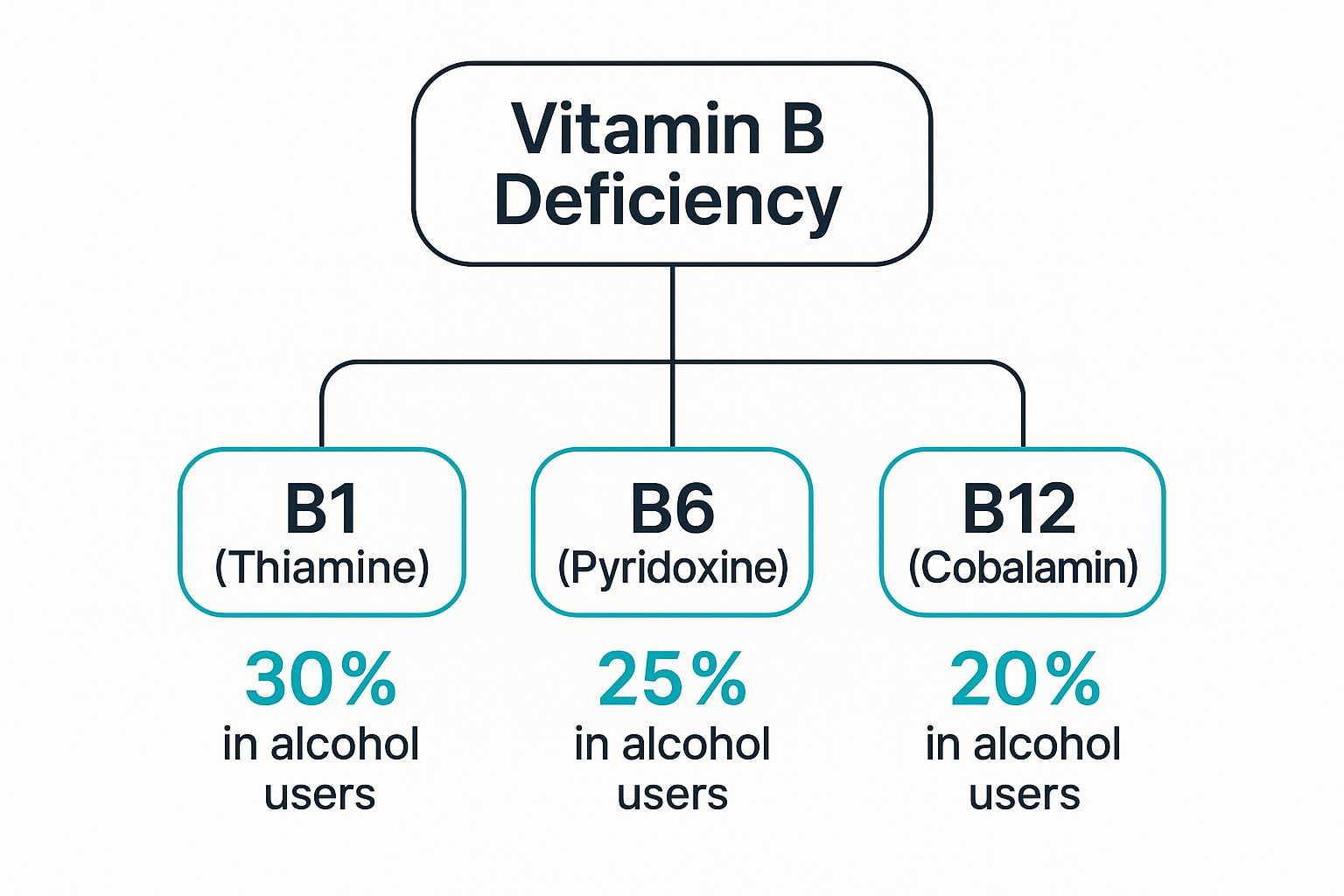
This data really drives the point home: regular drinking can lead to significant dips in Thiamine, Pyridoxine, and Cobalamin, highlighting just how vulnerable they are. Each member of the B vitamin family has a distinct and critical job, and when alcohol enters the picture, the entire team is put under enormous pressure.
The Long-Term Risks of Alcohol-Induced Deficiency
We’ve all felt the misery of a bad hangover, but the link between alcohol and vitamin B can spiral into something far more serious over time. A chronic shortage of these essential vitamins isn't just about feeling tired or foggy; it can set the stage for severe, and sometimes permanent, damage to your nervous system. The longer your body is deprived, the greater the risk.
One of the most alarming consequences stems from a severe lack of Vitamin B1 (Thiamine). This isn't some rare, fringe issue for people who drink heavily. In fact, research reveals that a shocking 80-90% of chronic alcohol users suffer from some level of thiamine deficiency. The reason is twofold: alcohol actively hinders your gut's ability to absorb thiamine while also disrupting how it's stored in the liver. A look at the data on global alcohol consumption and its health implications puts the scale of this problem into perspective.
When this deficiency reaches a critical point, it can ignite a devastating neurological disorder called Wernicke-Korsakoff Syndrome (WKS), sometimes grimly referred to as "wet brain."
The Devastating Impact of Wernicke-Korsakoff Syndrome
Try to imagine your brain losing its ability to make new memories. You might struggle to recall what happened an hour ago or the conversation you just had. This isn't just being forgetful; it’s a fundamental breakdown of your mind's capacity to record life as it happens. That’s the reality of WKS.
The condition typically appears in two phases. The first, Wernicke's encephalopathy, is an acute medical emergency marked by confusion, vision problems, and a staggering loss of muscle coordination. Without immediate, high-dose thiamine treatment, it often progresses to Korsakoff's psychosis, where the profound memory loss and inability to form new ones can become permanent.
The following image from the National Institute of Neurological Disorders and Stroke shows just how this syndrome attacks the brain.
As you can see, WKS damages deep structures like the thalamus and hypothalamus—regions vital for memory, learning, and regulating basic bodily functions. What’s truly heartbreaking about this condition is that it's almost entirely preventable simply by ensuring the body has enough thiamine.
Other Serious Long-Term Dangers
Beyond the dramatic risk of WKS, a persistent shortage of other B vitamins can lead to a whole host of different health crises that creep up over time.
- Anemia: When you're low on Vitamin B12 and Folate (B9), your body can't produce healthy red blood cells properly. This results in a specific type of anemia where the cells are too large and don't work efficiently, leading to deep fatigue, weakness, and even shortness of breath.
- Peripheral Neuropathy: A long-term lack of B6 and B12 can directly damage the nerves in your limbs. It often begins as a nagging tingling or numbness in your hands and feet but can escalate into burning pain, muscle weakness, and a permanent loss of sensation.
These aren't minor annoyances you can just shake off. They are serious, life-altering medical conditions. This really drives home why actively replenishing your B vitamins is so crucial if you drink alcohol—it's not just about feeling better the next day, it's a vital strategy for protecting your long-term health.
How To Replenish B Vitamins: Food vs. Supplements
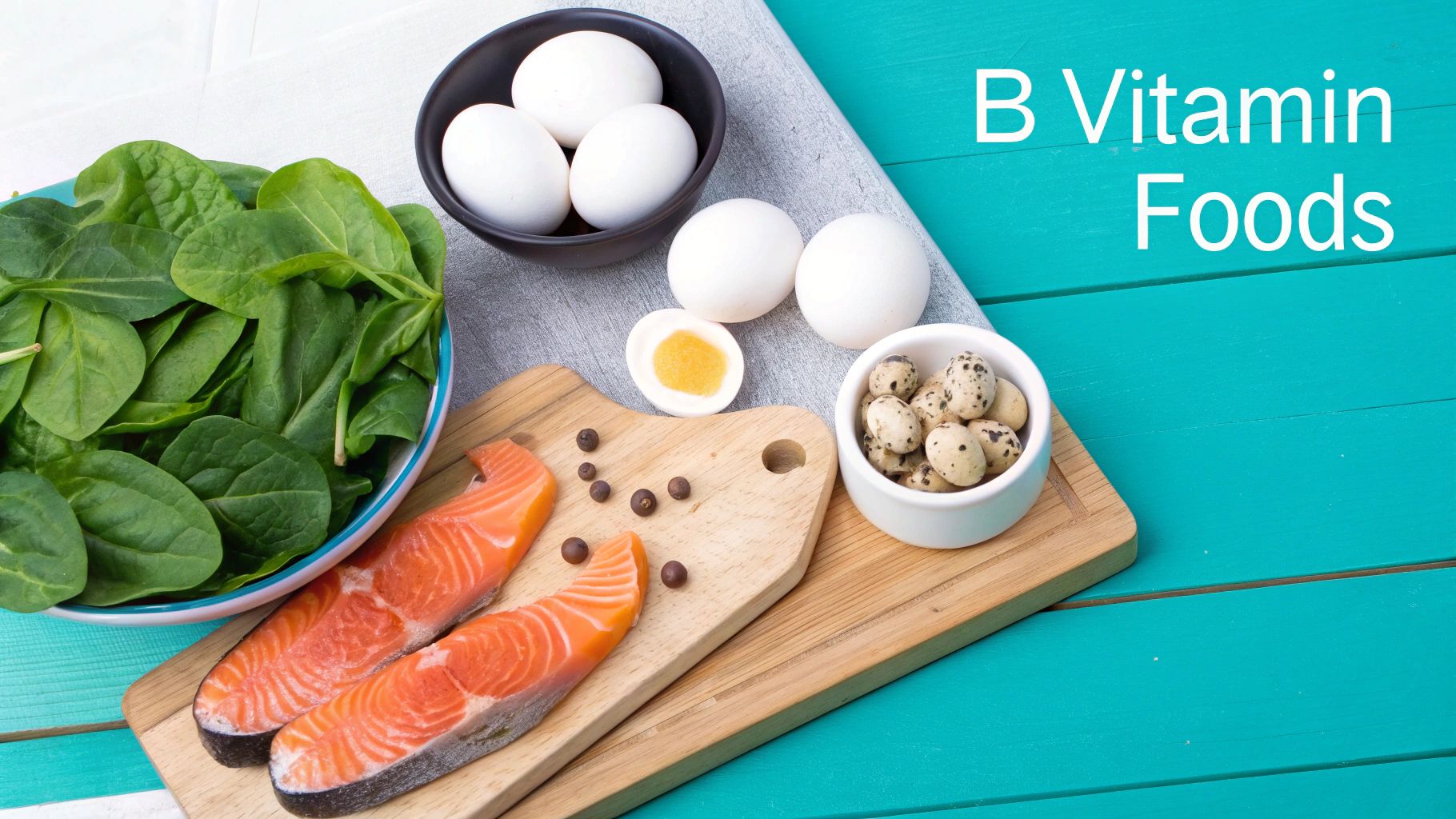
So, you know that drinking uses up your body's B vitamin stores. The logical next question is, what’s the best way to put them back? You've got two main options on the table: getting them from whole foods or turning to targeted supplements.
Let's be clear: a "food first" philosophy is always a solid starting point for good health. Building your diet around nutrient-rich foods is the best way to maintain your body’s baseline vitamin levels for everyday life.
Filling Your Plate With B Vitamins
Plenty of common, delicious foods are loaded with the B vitamins your body is crying out for. Making these a regular part of your diet helps build a strong nutritional foundation.
If you want to stock your fridge and pantry with B vitamin powerhouses, here's a quick cheat sheet.
Top Food Sources for Key B Vitamins
This table gives you a snapshot of where to find these essential nutrients in your diet.
| B Vitamin | Excellent Food Sources |
|---|---|
| B1 (Thiamine) | Pork, salmon, flax seeds, beans, lentils |
| B2 (Riboflavin) | Eggs, organ meats, oats, yogurt, mushrooms |
| B3 (Niacin) | Chicken breast, tuna, turkey, avocado, brown rice |
| B6 (Pyridoxine) | Chickpeas, tuna, salmon, potatoes, bananas |
| B9 (Folate) | Leafy greens (spinach, kale), asparagus, broccoli, legumes |
| B12 (Cobalamin) | Clams, beef, salmon, milk, eggs, fortified nutritional yeast |
Consistently eating these foods is a brilliant move for anyone looking to stay healthy. That said, when it comes to directly fighting back against alcohol's effects, relying only on food can be a bit like trying to fill a leaky bucket with a dripping tap. It's just not fast or efficient enough.
Why Supplements Are Often More Effective for Drinkers
Here’s the reality check. When you drink alcohol, your body’s ability to actually absorb nutrients from your food takes a nosedive. Alcohol directly irritates the lining of your stomach and intestines, which messes with the absorption of the very B vitamins you’re trying to restore.
Think about it this way: even if you eat an incredibly healthy, B-vitamin-packed meal, you might not absorb its full benefits if alcohol is still in your system. The irritation to your gut lining makes it less efficient at doing its job.
This is exactly where a good supplement becomes a much more direct and reliable game plan.
Supplements deliver a concentrated, high-potency dose of B vitamins that can sidestep some of these absorption roadblocks. They provide a much larger quantity of these key nutrients than you could ever get from a single meal, giving you a powerful tool to counteract alcohol's drain.
The critical concept here is bioavailability—which is just a fancy word for how much of a nutrient your body can actually absorb and put to work. High-quality supplements are designed with highly bioavailable forms of B vitamins, ensuring your cells get the fast-acting support they need to bounce back.
You can dive deeper into this in our guide on the connection between vitamin B and hangovers. For anyone who enjoys a drink, a targeted supplement isn’t just about convenience; it’s a smarter, more effective strategy for reversing nutrient depletion and helping your body recover.
Using a Targeted Strategy to Counteract Alcohol
So, we know alcohol wreaks havoc on our B vitamins. But what's the best way to fight back?
While a healthy meal or your daily multivitamin is better than nothing, it's often like bringing a water pistol to a firefight. Alcohol creates a very specific kind of metabolic mess, and a generic approach just doesn't cut it. To truly support your body, you need a strategy that directly targets the nutrients alcohol depletes and the toxins it creates.
This is where a purpose-built formula like Upside Hangover Sticks comes in. It’s not about just carpet-bombing your system with random vitamins and hoping for the best. It's a precise, targeted approach designed to address the core issues of an alcohol-stressed body.
A Smarter Approach to Recovery
A specialized formula works by tackling two problems at once: it restores what’s lost and helps clean up the mess.
First, it delivers a high-potency, bioavailable B-complex. This is a critical detail. Bioavailability is just a fancy word for how much of a nutrient your body can actually absorb and use. Highly bioavailable forms mean those B vitamins get to work fast, refueling your energy pathways and supporting your nervous system when they need it most.
Second, it includes other powerhouse ingredients that work in tandem with the B vitamins. Take Dihydromyricetin (DHM), for example. DHM gives your liver a direct helping hand. It supports the enzymes that break down alcohol and, more importantly, its toxic byproduct, acetaldehyde, helping your body clear it out much more efficiently.
This two-pronged attack—rapidly replenishing B vitamins while actively helping to clear out toxins—is what makes a specialized supplement so effective. It's like sending in a medical team to treat the injuries and a hazmat team to clean up the toxic spill, all at the same time.
This more focused, scientific approach is catching on. As more people understand the link between alcohol and vitamin B, they're looking for smarter ways to enjoy a drink without feeling terrible the next day. This shift is fueling huge growth in the no-and-low alcohol market and in functional beverages designed to offset alcohol's effects.
You can see this cultural change reflected in recent beverage industry analysis. For people who want to be mindful about their health, a targeted supplement offers a precise and evidence-based way to support their body.
Your Questions About Alcohol and Vitamin B, Answered
It's smart to question how alcohol and vitamins interact. Let's clear up some of the common questions so you can make better decisions for your body and your social life.
Can I Just Take a B-Complex Before Drinking?
It’s a good thought, and taking a standard B-complex is certainly better than nothing. But here's the catch: it’s often not enough to really tackle what alcohol does to your system. The biggest hurdle is absorption. Alcohol is a known gut irritant, and that inflammation makes it much harder for your body to pull in the nutrients it needs.
Imagine trying to water a plant with a leaky hose—some water gets through, but most of it is lost. A standard B-complex dose might not be potent enough to overcome the absorption issues alcohol creates. That’s why specialized formulas use more bioavailable (meaning, easy for your body to absorb) forms of vitamins, often alongside other ingredients that work together to provide real, effective support.
How Quickly Does B Vitamin Deficiency Happen?
You can feel the effects on your vitamin levels after just one night of drinking. That familiar brain fog and fatigue that define a hangover? B vitamin depletion is a major contributor. A more serious, chronic deficiency, however, is something that builds up over time with regular, heavy drinking.
A few things determine how fast your levels drop:
- How Much and How Often You Drink: More alcohol means your body burns through its vitamin stores much faster.
- Your Baseline Diet: If your diet is already a bit low in B vitamins, you have less of a safety net to begin with.
- Your Unique Biology: Genetics play a role, and some people are just naturally more prone to nutrient depletion than others.
For people who drink heavily and regularly, a significant deficiency in thiamine (B1) can develop in just a matter of weeks, which is why being proactive is so important for your long-term health.
Does Taking B Vitamins Mean I Can Drink More Safely?
Let's be crystal clear on this one: absolutely not. Taking B vitamins is a harm reduction strategy, not a permission slip to drink excessively. The entire point is to help your body cope with the metabolic stress of drinking by replenishing what's lost and helping to process toxic byproducts.
Think of it this way: supplements don't make alcohol "safe." They do nothing to prevent or reduce the serious long-term risks of drinking, such as liver damage, addiction, or cognitive issues. The goal is to support your body's recovery after you’ve had a few responsible drinks, not to enable drinking more.
Are B Vitamin Injections Better Than Oral Supplements?
In a clinical setting, for severe deficiencies like those found in Wernicke-Korsakoff Syndrome, injections are absolutely the standard of care. They are a medical necessity because they bypass a severely damaged digestive system and get high-dose vitamins straight into the bloodstream.
But for the average person who just wants to offset the effects of a few drinks and avoid a hangover, injections are overkill. A high-quality, bioavailable oral supplement is far more practical and perfectly effective. It gives your body the tools it needs to manage the stress of drinking and prevent those sharp nutrient dips that make you feel terrible the next day.
Ready to stop letting hangovers dictate your day? Upside Hangover Sticks offer a targeted, science-backed blend of bioavailable B vitamins, electrolytes, and DHM to help you feel your best after a night out. Give your body the support it deserves and wake up refreshed. Try Upside today!
